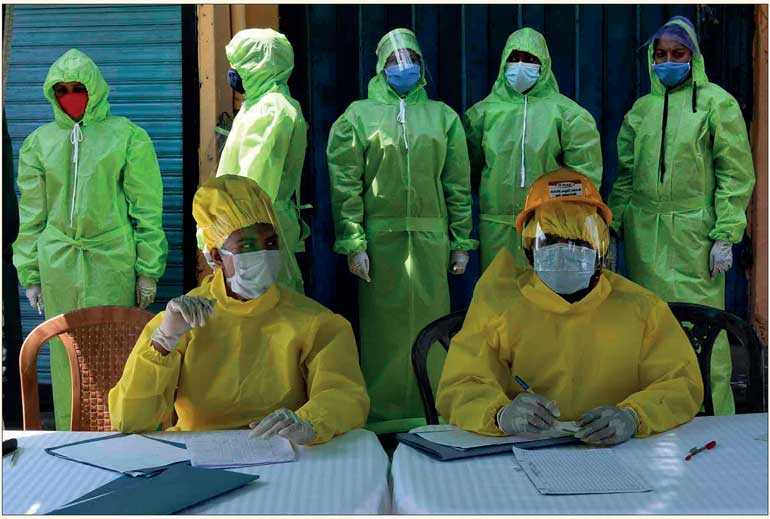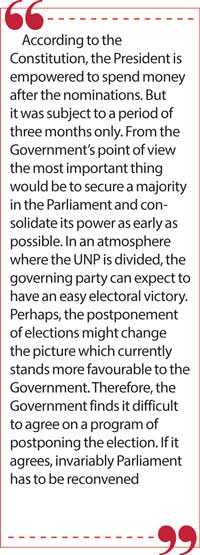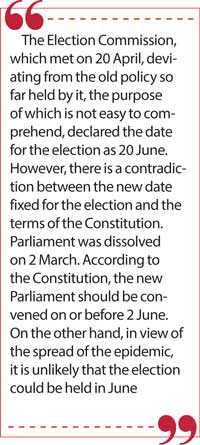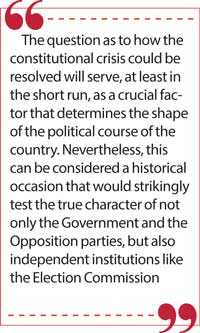Saturday Feb 21, 2026
Saturday Feb 21, 2026
Friday, 24 April 2020 00:00 - - {{hitsCtrl.values.hits}}

Even before the outbreak of the pandemic, the socio political system and the economy of Sri Lanka were not in a satisfactory state; rather they were in a state of decay and on the verge of near collapse.  The pandemic has only exacerbated the situation, accelerating the pace of the process by two to threefold.
The pandemic has only exacerbated the situation, accelerating the pace of the process by two to threefold.
The origin of the crisis
The fact that Sri Lanka gained independence without a collective effort had rendered it impossible to lay a solid foundation for the growth of social, political and economic sectors. Had the independence gained from colonial rule not been a mere gift but an outcome of a collective effort of all sections of society, certainly there would have been a greater possibility to integrate society in its entirety in the form of a modern Sri Lankan nation irrespective of ethnic, caste and religious differences whist at the same time adopting a unified national vision acceptable to all communities as well as formulating a common national policy for the conduct of the affairs of the country.
In terms of the accepted development benchmarks, Sri Lanka remained a flourishing country among the Asian countries by the time the British left the country. In terms of per capita income it was second only to Japan. In almost every sphere like education, health and infrastructure Sri Lanka was ranked either first or second among the Asian countries. All Asian countries that are currently on the list of advanced countries lagged far behind Sri Lanka by the time it gained independence.
The inability to build a modern Sri Lankan nation can be considered the major issue that caused the failure of Sri Lanka. The racial, caste and religious differences and discriminatory practices had a significant impact on the destructive and violent conflicts that broke out from time to time. These conflicts caused extensive damage to public life and property. Further, they led to disturb, distort and debilitate the socio political system.
The fact that Sri Lanka had not gained independence through a strong collective social effort prevented the emergence of an advanced democratic society and mature national leaders. So much so that after independence the country was not guided on a proper path, instead it was left to float sans a proper direction.
Bleeding era
The constitutional changes in 1978 can be considered a historical landmark which accentuated the unplanned and misdirected process which began after independence. The 1978 Constitution deprived the Parliament of its supremacy and vested the power of the State in the Executive President. It  enhanced the authoritarian character of the ruling power and paved the way for the ruling party to adopt a system that would allow them to plunder the public property at their whim and fancy in addition to ruling the country.
enhanced the authoritarian character of the ruling power and paved the way for the ruling party to adopt a system that would allow them to plunder the public property at their whim and fancy in addition to ruling the country.
Gradually, the importance attached to governance was subordinated to abuse and exploitation of public property. This situation, apart from undermining the economic power of the state, led to corrupt the entire institutional system of the country.
The enormous brutality unleashed in the society during the times of protracted violent insurrections launched by both Sinhala and Tamil insurgents and the security forces that suppressed them had caused to distort and afflict the social psyche which had already been distressed by the fear of death. Further, this has resulted in depriving and weakening the capacity of the society to assess the matters fairly and rationally.
Ignoring structural reforms
The social system had disintegrated and the State and its institutional system deteriorated by the end of 2009 when the internal Civil War was over. Although the State was able to defeat the violent rebellions, the latter had caused serious damage to the State and its institutional system. Consequently, the institutional system of the State was in a deplorable level of inefficiency and corruption.
Soon after concluding the internal civil war the government should have introduced structural reforms to eliminate the predatory nature, inefficiency and corruption associated with the State administration as a forerunner to unify the fragmented nation and promote national integration so that a firm foundation for progressive march of the country would have been laid. But, the ruling party which won the war ignored the pressing need for structural reforms and attempted to move forward with the glorification of triumphal feelings of the war victory.
The defeat suffered in the election of 2015 by the Government in office can be considered a punishment for its negligence and abstaining from initiating structural reforms that the country needed badly. The attempt of the Yahapalana regime which came to power subsequently to proceed with false reforms, ignoring the need for genuine structural reforms, eventually failed in a ludicrous fashion.
Epidemic exacerbates the crisis
It was against this backdrop and an immediate outcome of it that Gotabaya Rajapaksa became the President. The situation of the country was not good and the country had been moving towards a  complete breakdown when he took the reins of the presidency which was no way propitious for smooth running of the administration.
complete breakdown when he took the reins of the presidency which was no way propitious for smooth running of the administration.
Even though the new President was elected by popular vote, treating the entire country as a single constituency, the President elected did not have the executive powers to rule the country fulfilling the aspirations of his supporters. Instead, the executive power rested on the Cabinet of Ministers led by the Prime Minister who was elected by the Parliament.
The irony was that the people who elected Gotabaya Rajapaksa were of the view that the new President, their leader was empowered with the absolute power to rule the country. There appears to have been a great confusion and misunderstanding in regard to the powers of the President. However, the ruling party which had the majority in Parliament renounced the ruling power following its defeat in the Presidential Election and transferred the authority to rule the country to the winning party which did not have a majority in the Parliament.
The President, intent on securing majority power in Parliament and setting up a steady government dissolved Parliament at the earliest day that Parliament could be dissolved and fixed the date for nominations and elections. Although the Election Commission opted to accept nominations on the due date, in view of the pandemic that broke out in the interim, it decided to postpone the date originally fixed for holding the election. The decision to postpone the proposed date of election might have been the best option available for the Election Commission. However, the decision of the EC didn’t comply with the political aspirations of the Government.
According to the Constitution, the President is empowered to spend money after the nominations. But it was subject to a period of three months only. From the Government’s point of view the most important thing would be to secure a majority in the Parliament and consolidate its power as early as possible. In an atmosphere where the UNP is divided, the governing party can expect to have an easy electoral victory. Perhaps, the postponement of elections might change the picture which currently stands more favourable to the Government. Therefore, the Government finds it difficult to agree on a program of postponing the election. If it agrees, invariably Parliament has to be reconvened.
In such an eventuality, the Government would invariably be compelled to function without an absolute majority in Parliament. On the other hand, the way the Government tackles the pandemic and the economic crisis will have a greater impact on an election held at a later date. In this backdrop, from the point of view of the Government, the most viable option would be to have an election as early as possible.
The dilemma
The Government’s approach to have a speedy election was not compatible with the pandemic situation in the country. The Election Commission requested the President to seek the guidance of the Supreme Court to resolve the issues arising from the fact that it would not be feasible to hold an election within the time frame specified in the Constitution. However, the President did not accept the advice. Instead, the Secretary to the President informed the Election Commission in writing that it was the responsibility of the Election Commission to decide a suitable alternate date for the election.
The strategy adopted by the Government to obtain an early date for the election was to persuade the Election Commission that the gravity of the epidemic situation had diminished. A propaganda campaign was also launched to impress the EC that the situation would be normalised by 19 April. In addition, the lockdown measures were also relaxed.
The Election Commission was scheduled to meet on 20 April to review the election. By then, it had become obvious that there was disagreement among the members of the commission. On 19 April, a rapid increase in the number of infected people was reported, disrupting the Government’s strategic plan.
The Election Commission, which met on 20 April, deviating from the old policy so far held by it, the purpose of which is not easy to comprehend, declared the date for the election as 20 June. However, there is a contradiction between the new date fixed for the election and the terms of the Constitution. Parliament was dissolved on 2 March. According to the Constitution, the new Parliament should be convened on or before 2 June. On the other hand, in view of the spread of the epidemic, it is unlikely that the election could be held in June.The easiest way to avoid a constitutional crisis would have been to consult the opinion of the Supreme Court. The President doesn’t like it. Surprisingly the Commissioner of Elections also seems reluctant to go to Courts. However, the Supreme Court, in an earlier occasion had pointed out the powers and freedoms vested in the Commissioner of Elections by the Constitution and advised the latter to take bold decisions and seek the opinion and advice of the Supreme Court only if necessary and where he is unable to make bold decisions, (Vide Karunatilake and another V Dayananda Dissanayake, Commissioner of Elections and others, 1999 (1) SLR p157).
Under the circumstances, it can be said that the Commissioner of Elections had deprived himself, knowingly or unknowingly, of the capacity and the opportunity to prevent the possibility of a constitutional crisis by ignoring the powers vested in him by the Constitution and the Supreme Court.
Now the train is on another track and not on the rail. Apparently, it’s going to move on a trunk-road and not on the rail. Not only the engine driver but also the passengers in the train seem to prefer the journey on the roadway rather than the railway. Apart from the pandemic and the collapse of the economy associated with it, it is now possible for the country to plunge into a constitutional crisis. Eventually, this might even end in the total collapse of the socio-political system of the country.
The corona pandemic is only an accident, not a wilful manoeuvring of an evil force to sabotage the Government’s political path. It is true that it has obstructed the capacity of the Government to consolidate its power. Yet, it is dangerous to play with the pandemic to overcome the dilemma the Government is facing.
The question as to how the constitutional crisis could be resolved will serve, at least in the short run, as a crucial factor that determines the shape of the political course of the country. Nevertheless, this can be considered a historical occasion that would strikingly test the true character of not only the Government and the Opposition parties, but also independent institutions like the Election Commission.
End of an era?
Even before the outbreak of the pandemic, the country was not in good shape; it was in a state of degeneration and decay; the entire political system was on the verge of near collapse. The pandemic has only accelerated the process of the collapse of the political system. It is happening not due to social influence but on the internal drawbacks inherent in the system itself. Once a house is dilapidated and decayed beyond repair, and if the occupants of it continue to linger in it without demolishing it, then inevitably the house might collapse on its own at some point of time. Perhaps the same can be said about what is going to happen to the political system of Sri Lanka.
The extent of impact that the corona pandemic might have on the lives of the people of Sri Lanka is not clear. The impact it has already made on the socio political scenario and the economy is enormous. The social system is in a state of near collapse. Also, the State is in a helpless state where it is forced to rely on the aid received for containment of the pandemic. All revenue sources of the Government have collapsed. The operations of the private sector have shrunk to a great extent creating a situation where millions are likely to lose their jobs.
Apparently, one era in Sri Lanka is moving towards an end, not prompted by the aspirations of the people but due to the influence of internal factors. Yet, it is not clear whether the new era that follows will be a progressive or regressive period compared to the bygone era.